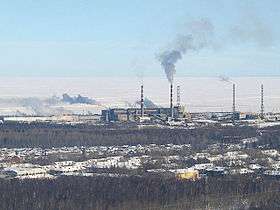Environmental issues in Russia
There are numerous environmental issues in Russia. Many of the issues have been attributed to policies during the Soviet Union, a time when officials felt that pollution control was an unnecessary hindrance to economic development and industrialization. As a result, 40% of Russia's territory began demonstrating symptoms of significant ecological stress by the 1990s, largely due to a diverse number of environmental issues, including deforestation, energy irresponsibility, pollution, and nuclear waste.[1]

Wildlife
Russia has many protected areas, such as zapovedniks and natural parks, which are made to preserve the natural state of environments. There are currently 101 zapovedniks that cover a total of over 33.5 million hectares.[2] However, some animals, such as the Amur tiger, polar bear and Caucasian leopard, are facing extinction. The Russian government is attempting to revive those populations.[3] A tiger summit was held in St. Petersburg in 2010 to discuss how to save the dwindling tiger population, which is threatened by deforestation and poaching in Russia.[4]
Deforestation
Excessive logging is causing the widespread deforestation of certain areas of Russia. Despite efforts of Russian authorities to preserve forests using nature reserves and parks, funding for park rangers is lacking, limiting the protection of forests.[5] Illegal logging is also widespread, especially in the north-west and in the Far East parts of Russia. It is estimated that Russia loses $1 billion every year due to illegal logging.[6] According to the Center for Russian Environmental Policy, 16 million hectares of forest are lost each year to a variety of causes, including logging, pollution and fires. Inefficient logging and clearcutting strategies result in 40% of harvested trees never being used, and the implementation of forest protection policies has been slow.[1]
Energy
Inefficient energy usage and the use of fossil fuels is another environmental issue that Russia faces. The Ministry of Fuels and Energy stated that upgrading energy sector equipment could cut carbon emissions by 25%, and the Energy Research Institute predicts that such measures could save up to $1 billion of fuel every year.[7] 68% of Russia's energy is produced by polluting fossil fuels, and it is a large producer of those fuels.[8]
Nuclear energy

Nuclear energy is widely used in Russia, and there are currently 31 operating nuclear reactors.[9] However, several of these, such as the one at the Kola NPP, are past their lifespan and have a higher probability of nuclear accidents. Instead of being decommissioned, they are still being used. The disposal of nuclear waste is also an issue, due to a lack of funding. Unsafe dumping methods are sometimes used to get rid of nuclear waste, which was dumped into the Sea of Japan until 1993.[5] The Commission of Ecological Security, founded in 1994, helped bring the dumping of nuclear waste into ocean to the public's attention. It is estimated that bringing nuclear safety levels to official standards would cost $26 billion.[7]
The testing and production of nuclear weapons also had an effect on the environment, such as at the Mayak nuclear weapons production plant near Chelyabinsk.[5]
Pollution

Water pollution
Water pollution is a serious problem in Russia, and 75% of surface water and 50% of all water in Russia is now polluted.[1] This has caused health issues in many cities as well as in the countryside, as only 8% of wastewater is fully treated prior to being returned to waterways. Obsolete and inefficient water treatment facilities, as well as a lack of funding, have caused heavy pollution, and has also resulted in waterborne disease spread, such as an outbreak of cholera spread by the Moskva River in 1995. Industrial and chemical waste is often dumped into waterways, including hydrogen sulfide, which has been linked to the large-scale death of fish in the Black and Caspian seas. Lake Baikal was previously a target of environmental pollution from paper plants, but cleanup efforts since then have greatly reduced the ecological strain on the lake.[1] ттт
Air pollution
Russia's air is among the most polluted in the world, although its quality has been improving since the 1990s. 43.8 million tons of pollutants were released into open air in 1993, of which 24.8 million came from industry and 19 million came from vehicles. Moscow, St. Petersburg, Yekaterinburg and Volgograd, as well as other major industrial and population centers, are the highest concentrations of air pollution.[1] Overall, over 200 cities in Russia exceed pollution limits, and this is increasing as more vehicles appear on the roads.[7] Before the 1990s, most air pollution came from industries. When industrial production declined, emissions of air pollutants from those sources also declined, although the amount of motor vehicles on the roads skyrocketed. Currently, vehicle emissions exceed industry emissions in most Russian cities.[10] Air pollution is attributed to 17% of childhood and 10% of adult diseases, as well as 41% of respiratory and 16% of endocrine diseases.[7][10]
Other forms of pollution
Soil erosion
Snow run-off has caused substantial erosion in pastures and croplands in northern Russia, particularly near the Ural Mountains. In parts of southern Russia, overgrazing and deforestation has resulted in large plots of bare soil which are highly susceptible to wind erosion.[11]
See also
- Environment of Russia
- Energy policy of Russia
- Renewable energy in Russia
- Climate change in Russia
- Environmental issues in Lake Baikal
- Pollution in the Gulf of Finland
References
- 1 2 3 4 5 Curtis, Glenn E., ed. (1996). "Russia: A country study". Environmental problems. Washington: GPO (United States Government Printing Office) for the Library of Congress. Retrieved 2011-12-13.
- ↑ "Welcome to Wild Russia". Center for Russian Nature Conservation. Retrieved 2011-02-22.
- ↑ "Putin calls for animal conservation in Russia". RIA Novosti. Retrieved 2011-02-22.
- ↑ Kathy Lally (2010-11-23). "World leaders meet at tiger summit in Russia, pledge protection and cooperation". Washington Post. Retrieved 2011-02-22.
- 1 2 3 "Environmental issues in Russia". Norges Naturvenforbund. Retrieved 2011-02-22.
- ↑ "Environmental problems in Russia". WWF. Retrieved 2011-02-22.
- 1 2 3 4 "The Environmental Outlook in Russia". National Intelligence Council. January 1999. Archived from the original on May 28, 2010. Retrieved 2011-02-22.
- ↑ "Russia- Electrity". U.S. Energy Information Administration. November 2010. Archived from the original on December 28, 2010. Retrieved 2011-01-23.
- ↑ "Nuclear Power in Russia". World Nuclear Association. February 2011. Retrieved 2011-02-22.
- 1 2 "TED Case Studies: Russia Air Pollution". American University. Retrieved 2011-02-22.
- ↑ Frederick R. Troeh, J. Arthur Hobbs & Roy L. Donahue (2003). Soil and Water Conservation for Productivity and Environmental Protection (4th ed.). Prentice Hall. p. 31. ISBN 978-0130968074.
| ||||||||||||||
Center for Russian Nature Conservation. Retrieved 2011-02-22.